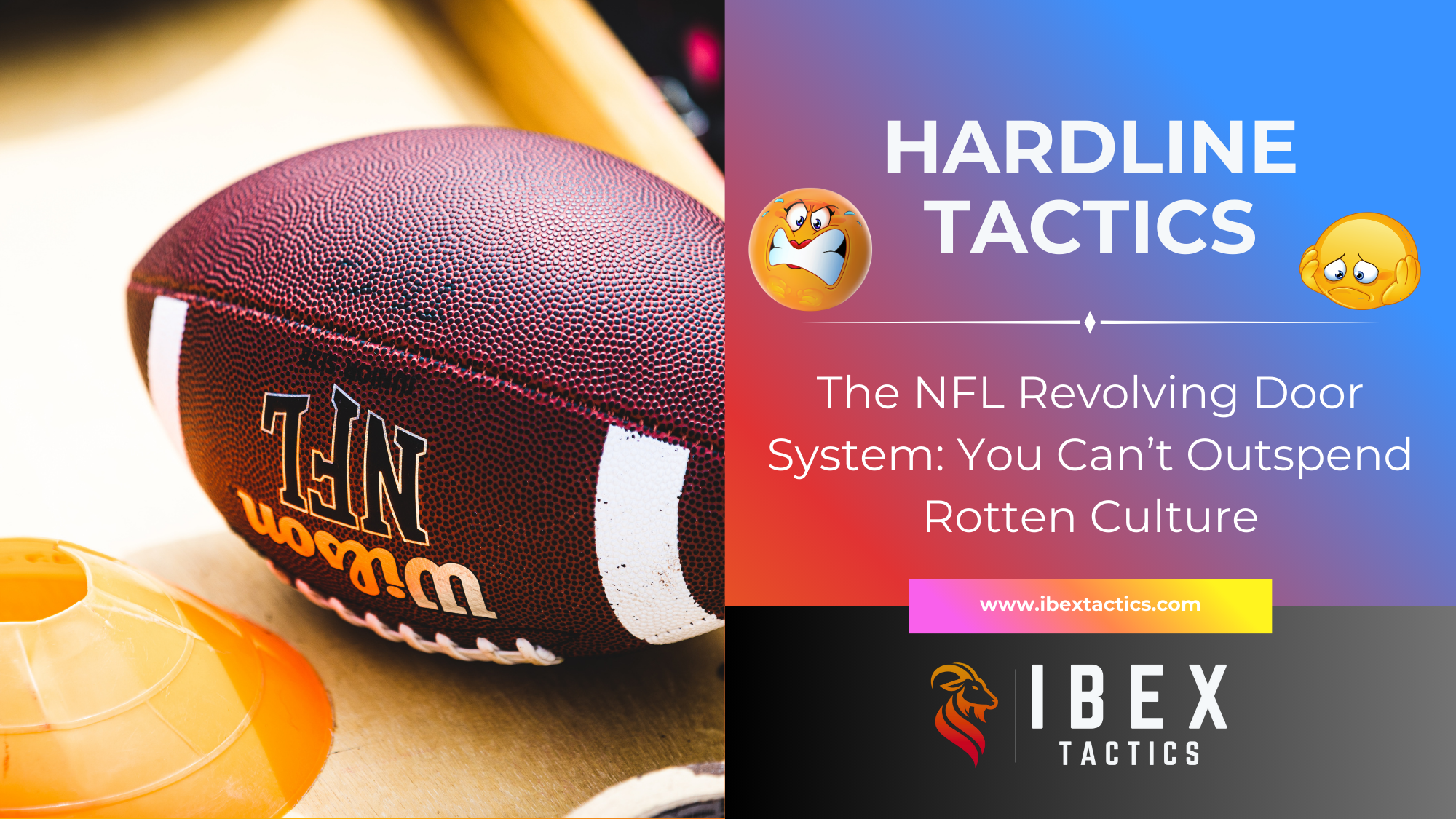The NFL Revolving Door System: You Can’t Outspend Rotten Culture
About Case Study Authors
Ibex Tactics LLC, was founded by Alex Bolowich & Ben Foodman. Before starting the company, Alex and Ben were working with athletes on an individual basis, helping them improve their mental performance using sport psychology-based interventions. While both professionals had incredible success working with some of the world’s most elite athletes, a significant portion of the time they were unable to help some of their clients due to the poor cultures these athletes were immersed in. As a result, Alex and Ben created Ibex Tactics LLC, which dedicated towards providing science-driven solutions to helping teams build resilient cultures.
TABLE OF CONTENTS
INTRODUCTION: The NFL Is A Case Study On Team Culture
PART I. What Is the NFL Revolving Door System?
PART II. Why Do Organizations Get Comfortable With The Revolving Door?
PART III. Why Developing Team Culture Is the Correct Solution
PART IV. How To Use Science To Drive Performance-Optimized Culture
Introduction: The NFL Is A Case Study On Team Culture
It’s that time of year, and we are all gearing up for the football season so we can pull for our favorite team’s to dominate on the gridiron! We all love watching the NFL for different reasons. Some of us follow specific player's careers, while others love studying the statistics for our Fantasy Football Leagues. But one thing that most of us love about the NFL…is the DRAMA that comes with this league! And the NFL is never short on dama-filled content. But there is one aspect of this drama that we here at Ibex Tactics are most fascinated with…and that is what we refer to as the NFL Revolving Door System.
The NFL Revolving Door System refers to when teams burn through millions of dollars, constantly replacing GMs, coaches, players and fans until they HOPEFULLY get it right (i.e. winning consistently)! If you are a fan of a LOSING NFL team, odds are your team probably has a culture that resembles the revolving door system. But here’s the thing…it doesn’t have to be this way, and constantly HOPING your organization will fix the problem is not the right play call! So, if you are a fan of this type of organization that has been experiencing the chaos described (or maybe you work at one), one of the first things you can do is understand WHY these organizations have a culture that employs an NFL Revolving Door System. Let’s dive deeper into this!
Part I. What Is the NFL Revolving Door System?
As previously mentioned, the NFL Revolving Door System refers to a process where NFL organizations constantly churn through their GMs, coaches, players and fans, until they HOPEFULLY catch that elusive winning formula in a bottle! The owner or leading influencer of the club will fire coach after coach, replace GM after GM, draft player after player, but only look at their setbacks as a “personnel” problem. Based on our experience, this is all too common of a diagnosis that keeps getting administered over and over again with no results, and a hefty bill when all is said and done! Interestingly, the revolving door system is getting more public attention in ways the influencers of the NFL may not have realized…and the PR is not helping with their brand!
One example of how the revolving-door system is creating negative results for these organizations is through the NFL Players Association. They have been posting what is referred to as the NFLPA Report Card, which is an annual player survey report where teams were graded based on player satisfaction in several specific categories, including travel accommodations, treatment of families, food and nutrition, locker room condition and coaches and ownership. Many teams that scored low on the report card not only had poor on the field production, BUT ALSO had some of the highest turnover rate in coaches, and had some of the worst records of ALL NFL teams. It’s safe to say that the reputation of these of these organizations probably affected free-agent decisions, on the field performance, employee burnout, decreased fan engagement, as well as organizational culture. But if influential leaders within these organizations see what we are all seeing, why do they continue to stick with the revolving door system?!
Part II. Why Do Organizations Get comforTABLE With The Revolving Door?
In our experience, one of the reasons leaders are comfortable with the revolving door system is because they are not fully aware or connected to all the decisions that are made within their organization. Because upper-level management and c-suite executives cannot logistically be involved with every decision that is made within these organizations, they need to hire professionals that can make the decisions for them. But when these decisions have negative consequences, the reflex response of upper-level management is to fire and re-hire. In our conversations with these types of leaders, they say they are under pressure to meet time-sensitive deadlines and believe that firing and rehiring is the fastest solution. This pressure to meet performance demands while scaling the organization is referred to as hypergrowth. According to the Harvard Business Review, Hypergrowth refers to the steep part of the S-curve, where industries and firms grow at an explosive pace (go look at the front office, coaching staff, and organization-wide directory of any NFL team, and you will see how bloated these organizations can get).
Businesses rapidly expand, company valuation skyrockets, and the compound annual growth rate (CAGR) hits 40%+. Human capital also grows dramatically, as employee count steeply rises to support business growth. This sets hypergrowth companies apart from other firms, which have slower and more stable growth rates. Since they are scaling rapidly, hypergrowth firms need to quickly ensure that they have the right people and systems in place to withstand the speed at which they are growing. If they don’t, the organization can quickly fall apart. While hypergrowth companies face many obstacles, research shows that talent is their primary growth challenge. And one of their biggest talent priorities is how to scale and maintain culture. Culture, or the underlying beliefs and values that shape an organization, can indeed be difficult to manage when a company scales from 10 to 1,000 employees. So, if culture is the answer to hypergrowth and the NFL revolving door system, why does upper level-management not invest in creating a performance-optimized culture? It’s because they don’t actually understand culture, they don’t know how to measure it and usually outsource it to their HR department. Let’s dive deeper into this.
Part III. Why Developing Team Culture Is the Correct Solution
At Ibex Tactics, we define culture as shared behaviors amongst a group of individuals all working to achieve the same goal. One of the main reasons we created a company that is focused on developing culture, is because in our prior jobs working individually with athletes on their mental performance training, we found that no matter how talented the athlete was, they could never outperform a bad culture. Take it for what it’s worth, almost every single one of the athletes we have worked with was part of a team that had HR departments and leadership that preached about the importance of culture but never practiced it. However, the few times when our athletes were a part of a performance-optimized culture, they were almost always able to achieve their peak potential. Interestingly, there is plenty of data-driven research and case studies that supports this experience:
For example, several years ago the Carolina Panthers had 2 quarterbacks on their roster that they eventually cut due to “performance-related” issues. However, once those players left the Carolina Panthers, they both went on to have banner seasons.
Mayfield, the No. 1 pick in 2018, helped lead the Tampa Bay Buccaneers to a second straight NFC South title since joining the team, putting up Pro Bowl-caliber stats with 4,279 yards passing and 39 touchdowns.
Darnold, drafted two spots below Mayfield, threw for 4,153 yards and 35 TDs and had the Vikings on a nine-game win streak and in contention for the top seed in the NFC playoffs. The only thing that changed for those two competitors was the change in scenery, not their talent. This case study is almost unheard of yet speaks to the obvious culture problems the Panthers were facing.
In regard to the research, the Harvard Business Review explored a study that examined the difference between companies that actually practice enforcing culture versus those that basically “talk a big game” but don’t practice what they preach: In many organizations, work on culture begins with visible gestures. Leadership teams roll out refreshed values, commission posters, launch Slack emoji packs, or schedule empathy workshops. While the intent is often genuine, when these symbolic efforts aren’t accompanied by a shift in leadership behavior, employees don’t feel inspired—they disengage.
Our research found that across companies that had launched formal culture initiatives since 2022, 72% showed no meaningful improvement in employee trust, engagement, or retention one year later. Despite the visibility and investment, employees perceived these efforts as surface-level — more performance than practice.
The reverse was also true. In companies where senior leaders changed how they led—how they ran meetings, gave feedback, made decisions, and responded to challenge—trust scores rose by an average of 26%, even in the absence of a branded campaign. As one executive told us, “We didn’t write our values—we reverse-engineered them from how we wanted to behave.”
Another senior leader put it simply: “We didn’t announce a culture shift. We just started acting like it mattered.” The problem isn’t the intention—it’s the framing. Culture is still too often treated like a project: something to roll out, brand, or assign to HR.
Meanwhile, underlying power dynamics, communication habits, and decision-making norms go untouched, and the deeper operating system stays intact. Employees notice. In fact, 59% told us that senior leadership actions contradict stated values at least weekly. These aren’t abstract misalignments—they’re visible breaches that undermine credibility and sap momentum. No amount of cultural branding can offset that kind of signal loss.
Part IV. How To Use Science To Drive PerforMANCE-Optimized Culture
So instead of using a traditional, fake culture initiative to improve a revolving door system, what should organizations do differently to get improved results? The first thing they need to do is gather data that quantifies what the underlying issues are. This can be painful and challenging work, but necessary. If the mission statement of an organization like an NFL team is to ACTUALLY WIN, then everything needs to be on the table. However, if leadership and front-line talent is truly invested in developing and enforcing performance-optimized culture, the research consistently demonstrates the benefits that these organizations can achieve building out this aspect of their teams. If this is something that interests you, we have recently unlocked our premier A-5 assessment, which examines the 5 pillars of a performance-optimized culture. Unlock the A-5 assessment below and book a FREE strategy call with us to see how you can get your team’s culture to the level of performance you know it should be!
NOTE TO READER:
Alex and Ben wanted to compile their expertise in the Ibex Tactics Case Studies to help teams in the sports and corporate sector better understand how many of the issues they are dealing with are more often than not related to culture. Most teams recognize that culture is an important component of their success, but do not always have the resources or expertise to analyze the complexity of culture. If you are interested in learning more about the services that Ibex Tactics offers to help with culture development, use the contact form below and sign up with your email to receive updates on new services and case studies!
Start your application today!
Are you looking for a way to enhance your organization’s performance outcomes? Are you curious to learn more strategies that can enhance your team culture? Use the form below to begin the application process to start the process of getting on our client list!
ARE YOU A PART OF THE HERD?!
Make sure you stay up to date on new case studies, services and relevant updates about Ibex Tactics! Don’t wait! Sign up below!
















